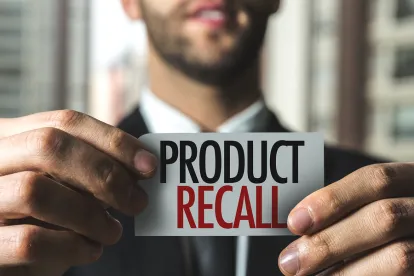Installation issues seem to be at the heart of an April recall of approximately 129,000 Murphy wall beds announced by Bestar and the US Consumer Product Safety Commission. The recall announcement points to “serious impact and crushing hazards” posed by the beds. At the time the recall was announced, Bestar had received reports of 61 incidents, including the death of a 79-year-old woman after a Bestar wall bed fell on her. Rather than describing a specific defect in the product itself, the recall advises consumers “who are uncertain whether their wall bed needs to be reinstalled” to contact Bestar for a free inspection and, if required, free professional reinstallations. The beds were sold online at a variety of popular online marketplaces, including Wayfair.com, Costco.com, Cymax.com, and Amazon.com.
Three recalls in April serve as a reminder that small parts always pose a risk of causing a recall-inducing product hazard because small parts can separate from a product, which poses a choking hazard to young children. The products included a woven bunny-shaped basket (because the eyes could detach), a wooden push toy (because the toy’s rolling cylinder could separate and expose the small balls inside the cylinder), and a wooden robot toy and a wooden sensory board toy (because small parts could come loose from the toys). Along similar lines, several products were recalled in April because their packaging was not child-resistant, as required by the Poison Prevention Packaging Act. The products included an essential oil containing methyl salicylate, prenatal and immunity capsules containing iron, hemp seed oil pain relief creams and lotions containing lidocaine, and lye caustic soda containing sodium hydroxide.
Finally, fire and burn hazards remain ever-present sources of risk. Best Buy recalled approximately 635,000 air fryers and air fryer ovens due to several dozen reports of the air fryers catching fire, burning, or melting.
Lawyers from Hunton Andrews Kurth LLP’s insurance coverage practice provide an update on recent recall-related insurance coverage disputes below:
We previously reported on Landec Corp.’s action against its insurers (see here and here), which arises out of the insurers’ denial of coverage for over $5 million in losses related to a government-ordered recall of kale salad products. Since our last update, the court granted the issuers’ motion to dismiss the California suit on forum non conveniens grounds. The court concluded that the policy’s Forum Selection Clause requiring any suit be in New York controlled and barred Landec from litigating in California. The court rejected Landec’s argument that the Service of Suit provision specifying that the insurers would submit to “a court” in the United States conflicts with the Forum Selection Clause. In reconciling the two provisions, the court stated that the Service of Suit provision requires the insurers to submit to “a court” but that the Forum Selection Clause identifies the forum of that court. The court also distinguished the holding of another California federal court that reached the opposition conclusion. In that case, the court said, the Service of Suit provision was added by an endorsement that stated it modified the policy, which indicated that it was intended to supplant the Forum Selection Clause; whereas, Landec’s Service of Suit provision was not added by endorsement and there was no indication it was meant to modify the Forum Selection Clause. Thus, Landec will be litigating its coverage dispute in the Empire State.
In Houston Casualty Co. v. Andrew Smith Co., No. 1:22-cv-03615, (May 4, 2022 SDNY), an insurer sued its policyholder seeking a declaration of no coverage under a Product Contamination Insurance Policy in relation to the CDC and FDA’s 2018 public warning of lettuce contaminated with E. coli; the Complaint can be found here. The insurer, Houston Casualty Co. (HCC), issued a policy to Andrew Smith Co. that promised to cover “any actual accidental or unintentional contamination, [or] impairment of Products” where consumption of such products would result in identifiable symptoms of bodily injury. Following the FDA’s warning, Andrew Smith incurred over $500,000 in costs related to lettuce it had harvested that was sold to consumers (the Complaint does not explain the nature of the costs incurred) and turned to HCC for coverage. HCC denied coverage, contending that Andrew Smith had not provided proof of actual contamination of a product, as required under the policy. HCC alleges that numerous tests indicated that none of the lettuce supplied by Andrew Smith was contaminated with E. coli, and that Andrew Smith did not cooperate with HCC’s investigation. HCC did not address whether Andrew Smith’s lettuce was “impair[ed]” in some way. The one count Complaint seeks a declaration that no coverage is owed because Andrew Smith Co. failed to cooperate and because the policy is not triggered. We will continue to monitor this dispute for further developments.
We previously reported on Blue Bell Creameries USA, Inc.’s action against its insurers (see here), which arises out of a Listeria outbreak in 2015. Blue Bell Creameries and its insurers have since filed cross motions for summary judgment on whether Blue Bell’s insurers have a duty to defend a shareholder suit arising from Listeria contamination (Blue Bell’s briefing can be found here, here, and here; insurers’ briefing can be found here, here, and here. In 2015, multiple injuries and deaths were caused by Listeria contamination in Blue Bell ice cream products prompting a significant drop in Blue Bell’s stock. A shareholder derivative suit followed, alleging that Blue Bell’s officers and directors failed to establish a system that would have prevented the contamination. The insurers raise many arguments against coverage, including that the directors and officers are not insured because they were accused of having breached their fiduciary duties to Blue Bell and, therefore, couldn’t have been acting in their capacity as directors and officers. Blue Bell counters that the shareholders specifically allege that the directors and officers were acting in the normal course of the ongoing operation of the company. The insurers also argue that there wasn’t an “occurrence” because the directors and officers allegedly engaged in knowing and willful misconduct, which cannot produce an occurrence. But Blue Bell responded that the shareholders did not allege that the presence of Listeria in the ice cream was intentional, only that they did not respond to reports of contamination. The motions are being considered by the court.
In Golden Taste, Inc. v. Westchester Surplus Lines Insurance Co., No. 1:22-cv-00017 (S.D.N.Y. filed Jan. 3, 2022), Golden Taste sued its insurer, Westchester Surplus Lines, seeking coverage under a Recall Plus Insurance for Consumable Products policy. According to the Complaint, Golden Taste produces a variety of kosher food products, including Healthy Tuna Deluxe, a tuna fish salad product. Golden Taste alleges that, in March 2021, one of its retail clients notified it that there was visible organic growth in Golden Taste’s Healthy Tuna Deluxe product, which necessitated the recall and destruction of the product. Subsequent testing confirmed that Aspergillus spp., Candida Lipolytica, and Penicillium Spp were all present in the product. The policy covered, among other things, the voluntary recall of adulterated products where the consumption of those products would result in bodily injury. Nonetheless, Golden Taste alleged that Westchester Surplus denied coverage because the amount of contaminants found were not found to be dangerous to humans.
In Apex Oil Co. v. Starr Indemnity & Liability Co., No. 6:22-cv-00473 (W.D. La. filed Feb. 15, 2022), Apex Oil sued its insurer, Starr Indemnity, for breach of contract and bad faith following Starr Indemnity’s denial of coverage related to damaged oil. According to the Complaint, Apex Oil shipped oil to a client that was contaminated with potassium, which mixed with the oil that was already in the client’s storage tank and amounted to damage of the client’s oil. Starr Indemnity denied coverage pursuant to a Recall of Products, Work or Impaired Property Exclusion. In addition to its damages, Apex seeks its attorneys’ fees, a statutory penalty equal to 50% of the amount found to be owed and/or two times the damages sustained by Apex for Starr’s bad faith in arbitrarily refusing to pay the claim after a fully sworn proof of loss was provided.
Total Recalls: 17
Hazards: Fire/Burn/Shock (6); PPPA (4); Fall (3); Choking (3); Crash (2); Impact/Injury (2); Hypothermia (1); FHSA (1); Laceration (1); Carbon Monoxide (1)








 />i
/>i

